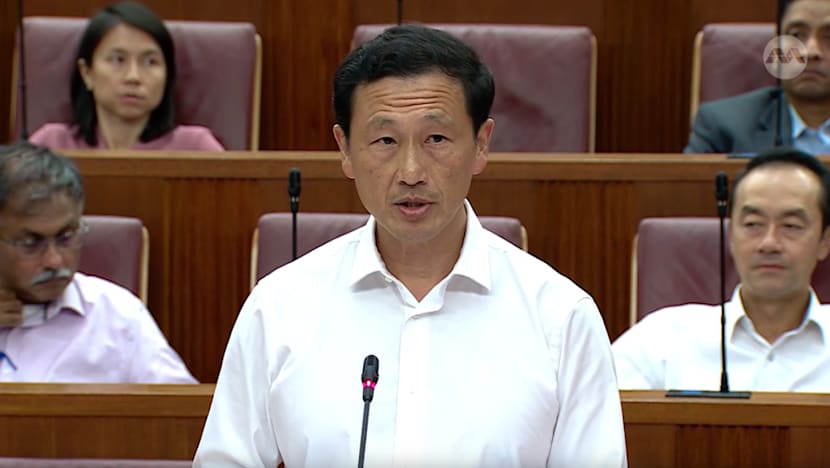Singapore came 'dangerously close' to racial politics in GE2025, says Ong Ye Kung
Mr Ong warned of "dire and lasting" implications for national unity if race and religion are allowed to shape political discourse.

Health Minister Ong Ye Kung speaking in parliament on Sep 23, 2025.

This audio is generated by an AI tool.
SINGAPORE: Singapore came "dangerously close" to mixing race and religion with politics during the 2025 General Election, said Health Minister and Coordinating Minister for Social Policies Ong Ye Kung on Tuesday (Sep 23).
Speaking in parliament on the second day of the debate on the President's Address, Mr Ong said Prime Minister Lawrence Wong himself had to call this out during the campaign.
Two Malaysian politicians and a former Internal Security Act detainee, now an Australian citizen, made Facebook posts urging voters to cast ballots along religious lines. The government subsequently instructed Meta to block these posts in Singapore.
Local Islamic preacher Noor Deros also made posts that blurred the lines between religion and politics, including one where he listed demands to politicians and claimed to have held meetings with Workers' Party (WP) Malay candidates. He urged his followers to vote for specific WP candidates.
“If things had played out differently, there would have been dire and lasting implications for the unity, harmony and the very fabric of Singaporean society,” said Mr Ong.
The best defence against populism is public rejection of it, he said. "To our great relief, that was what happened during GE2025," he said.
"No party or candidate won any seat by proposing unsustainable social welfare programmes, tearing down institutions, or by stoking anti-foreigner sentiments. Instead, our better angels prevailed."
Still, he cautioned that populism stems from genuine concerns among people, such as inequality or excessive competition for jobs and space from foreigners.
The "seeds" of populism thus exist in every society. "The question is whether these seeds are allowed to take root and grow," said Mr Ong.
"Anyone who peddles soft, partial truths, and easy but incomplete solutions waters these seeds; anyone who refuses the hard cognitive work of formulating rational policies provides fertile ground for these seeds."
POPULISM IN POLITICS
While "every politician hopes to be popular", Mr Ong said, populism is different. Populists often use an "us versus them" narrative, presenting themselves as champions of the people against elites, institutions, or outsiders, and offering simplistic solutions to complex problems.
"When people are disillusioned and disgruntled, they hope for a silver bullet and may give these simplistic solutions a chance," he added.
He cited Argentina's history of left-wing populism – where businesses eventually left due to excessive taxation, leading to job losses and economic crises. "In the end, the workers and ordinary people are the ones who suffer," he said.
Far-right populism, often linked to immigration concerns, is more widespread now, Mr Ong said, referencing countries like the US, UK, Australia and Japan.
"Populism takes societies on the road to ruin – creating irreconcilable rifts between communities, and fuelling xenophobia and racism," he said. "Eventually, either their fiscal system goes broke or the society breaks apart."
Singapore is not immune, he said, citing the Progress Singapore Party's post-GE2020 claims that the India-Singapore free trade agreement – the Comprehensive Economic Cooperation Agreement (CECA) – gave Indian professionals a "free hand" to work in Singapore.
"It was a seductive and simplistic argument, which took on an ugly racial tone. CECA-themed websites sprouted, filled with disturbing xenophobic views," said Mr Ong.
As a former trade negotiator, Mr Ong said he knew the allegations were false, referencing the ministerial statement addressing the issue.
"The PAP government’s job is to be keenly aware of what Singaporeans may be concerned about, address these concerns early ... and not let them fester and turn into something ugly that feeds populism," he added.
VOTERS NOW MORE DISCERNING
Mr Ong said the latest General Election showed that political parties are now held to higher standards by voters.
Despite the rise of memes and viral videos, "Singaporeans are becoming more discerning, demanding quality information on policies put forth by various parties," he added.
Citizens took their duty as voters seriously, attending rallies or watching them online, and listening to long-form podcasts to understand candidates' views. Populist and simplistic proposals were met with suspicion, said Mr Ong.
Still, he warned that this engagement cannot be taken for granted. He referenced Workers' Party (WP) leader Pritam Singh's appearance on a Malaysian podcast, where he said the PAP avoided difficult issues during the GE campaign.
Mr Ong disagreed, saying there had been "substantive discourse" on issues such as the Goods and Services Tax (GST), which was addressed by the prime minister and other ministers during rallies and podcasts.
"The fact that the subject of GST did not catch fire does not mean there was no discourse," he said. "It means that the PAP's explanations went at least some way to soothe people's natural unhappiness over a tax increase."
Such political discourse must continue beyond elections, he added.
"As politics in Singapore matures, this is what Singaporeans expect. They want to hear different perspectives, and see a contest of good ideas, so that the best ones can be used to take Singapore forward."
REAL ALTERNATIVES NEEDED
Mr Ong stressed the need for opposition parties to offer real alternatives, not just tweaks of government proposals or "simply jumping on the bandwagon every time an issue goes viral".
He cited how mature democracies present distinct visions: in the UK over Brexit or in the US between Republicans and Democrats.
"The WP has perhaps done this from time to time," said Mr Ong, referring to their calls for zero growth in foreign workers and preference for direct taxes over GST.
"If the WP is positioning itself as the '0.5' in a '1.5 party system', I think it needs to present a principled, consistent and coherent approach to the main challenges facing Singapore," he added.
Voters want more than just minor variations of PAP policies, which fall short of being a real alternative, he said.
"A real alternative promises gains with the accompanying trade-offs, so that voters can make informed decisions and not be lulled into comforting illusions."
This way, a vote for the PAP is an endorsement of its principles and governance style, while a vote for the opposition comes with support for their proposed policies and direction, and "not just a vote for checks and balances".
WP MUST "JUSTIFY ITS STANDING"
As the sole opposition party in parliament, the WP must "justify its standing" by developing its own alternative vision, policies and pathways, Mr Ong said.
WP retained its 10 seats and gained two Non-Constituency MP seats in the election.
Singaporeans expect high standards of honesty and accountability from the government and the ruling party. These same standards must apply to opposition parties, particularly those that present themselves as a serious alternative, said Mr Ong.
From time to time, party members may act unethically or even illegally, he said. But how parties respond matters.
"We need to acknowledge the shortcomings, take decisive actions, take responsibility, reflect and do what is necessary to prevent future occurrences," said Mr Ong.
"We have an overriding duty to preserve the integrity of our institutions and of the political system as a whole."
PAP will strive to serve all Singaporeans, including those who did not vote for the party, he added.
Mr Ong echoed President Tharman Shanmugaratnam's call for unity, stressing that politics must not divide the nation or invite foreign interference.
"We must not exploit foreign controversies for domestic political advantage; nor allow foreigners to exploit our domestic politics to drive a wedge in our society," he said.
"We must protect our common space. Reject populism. Never pit one group against another; nor sacrifice the common good for narrow interests or short-term political gains.
"Only then can politics truly serve the greater good of our country."
MORE INTENSE CONTESTATION THE "RIGHT POLITICAL DIRECTION": ONG
Mr Singh responded to Mr Ong's comments on the need for WP to present a clear and consistent alternative vision for Singapore.
The leader of the opposition noted that countries like the UK and Germany have “deep” political systems, unlike Singapore’s one-party dominant landscape since independence.
“Our system is very different. We deal with significant asymmetries of information,” he said. “Unlike the government, we don't have the capacity to conduct survey after survey to understand where the population is on certain issues, so the realities are quite different.”
Despite these constraints, he said the WP continues to offer voters an alternative, including a manifesto that outlines how its policies differ from those of the PAP.
In response, Mr Ong pointed to Singapore's political history in 1963, when the opposition Barisan Sosialis held 13 seats in a much smaller parliament but still presented a different vision and disagreed with the PAP on major issues such as the merger with Malaysia, language policy and National Service.
He acknowledged the WP’s growing presence in parliament and said it was likely to be a tough opponent in the next General Election.
“When you have come this far, I do believe the people will demand … will need you to come up with alternate policies, as in the past, Barisan Sosialis did with a small number of seats,” Mr Ong said.
Mr Singh also asked if the PAP was prepared to embrace a more inclusive political culture, such as allowing opposition MPs to participate in citizenship ceremonies.
Mr Ong replied that such events are grassroots initiatives tied to the PAP's efforts to engage the ground.
The reality is that if WP “rose to the occasion” and can contest against PAP the same way the Democrats and Republicans do in the US or the Tories and Labour in the UK, "life will be harder" for the ruling party, he said.
“Contests will be so much more intense, people will be so much more discerning with who they choose,” said Mr Ong. “But I think it is the right political direction for Singapore.”


















